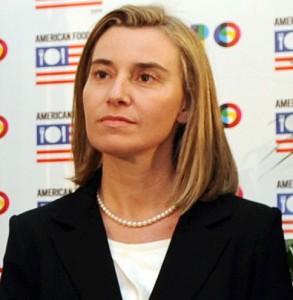
Federica Mogherini, High Representative of the European Union for Foreign Affairs and Security Policy and Vice-President of the European Commission designate.
Her appointment was the outcome of a long and difficult negotiation process between the European Council and President Juncker. Mrs. Mogherini emerged as a frontrunner for the post early on in the process but had been in the center of heated debates between Member States. In fact, several Eastern European Member States, such as the Baltic States, Poland and Bulgaria, were strongly opposed to her candidature, as she was deemed too Russia-friendly, and threatened to block her appointment. Moreover, many expressed concerns that, at a time of serious challenges and international crises, a candidate with a stronger background would have been more appropriate, as she lacked foreign policy experience, having been in her position only since January.
Therefore, Mrs. Mogherini assumes her new office with the challenge to prove that her commitment to the fundamental European values of freedom, democracy and respect for human rights is unwavering.
We at the International Campaign for Tibet have expressed our readiness to work closely with the new High Representative and have called on Mrs. Mogherini to ensure that human rights are included at every level of EU-China relations.
During her hearing at the European Parliament on 6 October, Mrs. Mogherini stressed her commitment to the promotion of human rights throughout all areas of her work, defining it as the “core business” and a precondition for stability. On that occasion, she also clearly stated that a reassessment of the EU’s relationship with Russia was needed by combining a “mix of assertiveness and diplomacy.”
She did not specifically refer to China and Tibet in her speech and focused more strongly on the ongoing political and humanitarian crises around the world. However, she pointed out that she attached great importance to the rights of ethnic minorities and would work on the prevention of discrimination against them.
We welcome Mrs. Mogherini’s strong human rights language, which makes us hope for a greater collaboration in the next five years.
Mrs. Mogherini has had a Tibet connection. During her time as a Member of the Italian Parliament she has met with the Dalai Lama and participated in the World Parliamentarians’ Convention on Tibet held in Rome in 2009. She has also met with representatives of the Tibetan leadership, including the Sikyong, Dr. Lobsang Sangay.
In recent years we have witnessed a disappointing, systematic downgrading of human rights issues in the EU’s foreign policy. Under Catherine Ashton’s leadership, human rights in the EU’s external action have been reduced to mere, occasional and rhetorical statements. On China specifically, we have often highlighted the lack of concrete progress of the EU-China human rights dialogue, which has failed to deliver improvements on the ground, and regret the fact that the Chinese government was able to reduce the rounds of this dialogue from two to one per year.
We hope that with a new High Representative, the EU will reinvigorate its human rights work and drift away from the worrying double standards it has adopted, and stop condemning human rights violations only in smaller and less strategically interesting third countries, while turning a blind eye towards powerful, strategic partners such as China.
It is urgently needed that the EU rethinks its human rights strategy and adopts a coherent and unified approach towards human rights issues in China and Tibet. This is necessary not only for the EU’s own credibility, but because this is its duty, according to the EU Treaties. We believe that securing human rights anywhere in the world will ultimately bring stability also to the EU and European citizens.
Mrs. Mogherini needs to prioritize this matter at the very beginning of her mandate and use all her exchanges with the Chinese leadership to reinforce the message that the current situation in Tibet is unacceptable for stable EU-China relations.
Only this way she will be able to bring the EU back to its role of human rights champion and promoter, and leave the current image of a weak and divided EU behind.
“United in diversity” is the motto, which the EU has proudly given to itself. It is time that this does not simply remain a slogan. It is time that the EU really starts acting as a strong, united and global actor for human rights and peace.
